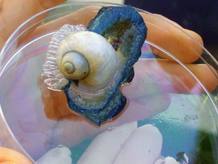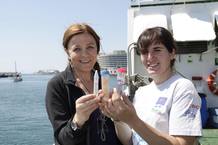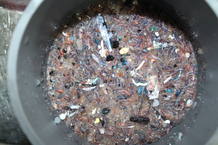
shellfish samples. MEDSEA
UAB professor, Patrizia Ziveri, with ICM-CSIC researcher Melissa Acevedo, with samples and small jellyfish microplastic Jordi Pareto

Photographs of a sample extracted plastics at sea. MEDSEA

More samples of plastics at sea MEDSEA
seas of the world are “acidic ‘, ie is reducing its pH due to chemical reactions that occur in the contact between the carbon dioxide emitted by humans and water.
Although acidification does not include ocean warming, does share with climate change caused the increase of CO2 in the atmosphere. And the marine environment not only receives ‘presiónn’ in relation to water temperature, but also by overfishing , the invasive species and deoxygenation .
A team of international researchers MEDSEA project, coordinated by the researcher from the Universitat Autònoma de Barcelona (UAB), Patrizia Ziveri, has returned from a research cruise in the Mediterranean to probe the current conditions Mediterranean Sea relation to the high concentrations of atmospheric CO2 and detect other anthropogenic impacts on the ocean, as the distribution of microplastic.
The Mediterranean Sea is of special interest to investigate ocean acidification because it is a sea resort, semi-closed and high environmental variability.
Finding class=”ladillo”>
One of the first discoveries of the research survey was the detection, in large offshore areas, small plastic waste floating . It is the first time you do a sampling of its kind in the Mediterranean Basin and the finding has surprised scientists, as indicated by the UAB in a statement.
also observed large concentrations of jellyfish at sea . In the western basin researchers have found large quantities of the species of jellyfish Pelagia noctiluca (luminescent jellyfish or carnation) and polyp Velella velella (sail sailing sea or purple) .
The data obtained allow advance the study of the causes of these blooms and determine if they are of anthropogenic origin, ie, the result of human activities.
Today, says the UAB, there is much speculation on the subject and in the scientific literature is cited as likely causes of these large concentrations of jellyfish the absence of predators due to overfishing, and increasing the average temperature of the sea. Although the campaign will contribute to progress, confirm or rule out these trends.
An unprecedented sampling
research campaign, the team has collected samples with four robots marine equipped with miniature sensors that have been launched in various parts of the Mediterranean. So have observed marine parameters: temperature, nutrients, salinity, chlorophyll, etc..
Sampling has involvedaerosol collectors, collectors of plankton , as well as systems for detailed samples water column and sediment to analyze the natural and artificial radioactive isotopes, and trace elements (present in very small amounts) dissolved in seawater.
scientists have collected samples of both surface and deep water to analyze the concentration of CO2 and other chemicals in the water, and its impact on certain organisms and biogeochemical processes.
The oceanographic cruise was carried out aboard the research vessel Angeles Alvarino, the Spanish Institute of Oceanography (IEO), in collaboration with the Marine Ecology Unit UTM-CSIC, and partially funded by FEDER. The boat has completed a two-stage cruise began on May 2, from Cadiz to Heraklion (Crete) and back to Barcelona, ??and its position can be tracked online.
The European project
MedSeA
coordinated by ICTA-UAB researcher Patrizia Ziveri, is a project funded by the 7th Framework Programme of the European Union and the Ministry of Economy and Competitiveness (MINECO) IMEDEA in collaboration with the Science Institute Mar (ICM-CSIC), the University of Cadiz, MEDSEA partners, the Spanish Institute of Oceanography, and the international program GEOTRACES.
Investigations are carried out in an interdisciplinary way, involving chemists, biologists, ecologists and economists, and provide new information and ratings on the responses of Mediterranean marine ecosystems to acidification, as well as a map of the most vulnerable . The results will help to improve current oceanographic models and regional policies to develop strategies to mitigate its effect.
No comments:
Post a Comment